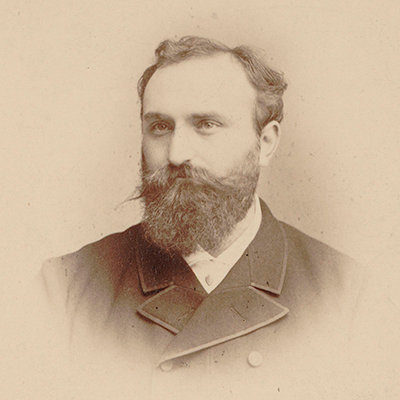Ernest Chausson

Born: January 20, 1855, Paris, France
Died: June 10, 1899, Limay (near Mantes-la-Jolie), France
Poème for Violin and Orchestra, Op. 25
- Composed: 1896
- Premiere: December 1896 in Nancy, Eugène Ysaÿe, violin
- CSO Notable Performances:
- First: January 1932, Eugene Goossens conducting, Jacques Thibaud, violin
- Most Recent: April 1995, Jesús López Cobos conducting, Itzhak Perlman, violin at the Centennial Gala Concert
- Instrumentation: solo violin, 2 flutes, 2 oboes, 2 clarinets, 2 bassoons, 4 horns, 2 trumpets, 3 trombones, tuba, timpani, harp, strings
- Duration: approx. 16 minutes
Chausson was the only surviving child of a wealthy Parisian building contractor who made a fortune in the massive mid-19th-century renovations of the city's Haussmann development. Young Ernest was tutored privately at home in a world of books and quiet where he had little contact with children of his own age, a circumstance that seems to have instilled an introspective disposition in the youngster. In a letter of 1876 to his godmother, Mme. de Rayssac, he wrote, “This relative solitude, along with the reading of a few morbid books, caused me to acquire a fault: I was sad without knowing why, but firmly convinced that I had the best reason in the world for it.” Such gentle melancholy was characteristic of Chausson throughout his life and reflected in many of his compositions. Chausson was eventually sent off to law school, from which he graduated in 1877, but he never lost his interest in art, literature and music. In 1879, perhaps inspired by a new-found love of Wagner’s music-dramas, he enrolled as a music student at the Paris Conservatoire. He began his studies with Jules Massenet but soon gravitated to César Franck, whose devoted pupil he became. It was from Franck that Chausson learned the modesty, seriousness of purpose and respect for the great masters that guided his work for the rest of his life.
By 1883, Chausson’s musical studies were finished and he married Jeanne Escudier, who bore him five children during their happy, settled life together. Their elegant Paris home was the site for many gatherings of the French artistic elite: Manet, Renoir, Degas, Rodin and Mallarmé regularly mingled with such prominent musicians as Franck, Chabrier, Dukas, Satie and Debussy. It was at those soirées where some of the stimulating interactions among the visual arts, literature, music and poetry that so influenced fin-de-siècle Parisian intellectual life took place. Chausson’s house was always open to aspiring musicians, and he was generous with his encouragement of younger composers, most notably Claude Debussy, with whom he became close friends, and the Spaniard Isaac Albéniz, who studied in Paris.
Chausson’s inherited wealth relieved him of worry about making a living from his compositions, though that advantage did not mean he took his creative work lightly. If anything, he was perhaps too self-critical and took umbrage at being called an “amateur composer.” His money allowed him to travel, and he was especially fond of visiting Brussels, where his works enjoyed a greater popularity than they did in Paris (Franck was a native of Belgium), and of spending the hot summer months in various country retreats that provided the peace he found conducive to composing. It was on one of those rustic sojourns to Limay, 40 miles west of Paris on the Seine, that he met his untimely death at the age of 44 when his speeding bicycle crashed into a wall, killing him instantly.
The Poème for Violin and Orchestra is one of Chausson’s most successful works, and the touching story of its publication is worth recounting. Isaac Albéniz, the Spanish composer, had been unhappy and bewildered during his student days in Paris. Chausson befriended, encouraged and supported him at the time, and Albéniz was determined to repay the favor. After Chausson finished Poème in 1896, he had some difficulty in having it accepted for publication. While touring Germany in the spring of the following year, Albéniz presented himself, with the manuscript of the still un-issued Poème tucked under his arm, to a representative of the eminent music publishing firm of Breitkopf und Härtel in Leipzig. Breitkopf refused to publish the score unless Albéniz offered to underwrite the cost of the venture, which he gladly did. In addition, Albéniz provided 300 marks that Breitkopf was to pass on to his mentor as a royalty. Chausson never discovered the scheme. Chausson, who had never been treated kindly by publishers, was overwhelmed when Albéniz informed him of his good fortune.
—Dr. Richard E. Rodda